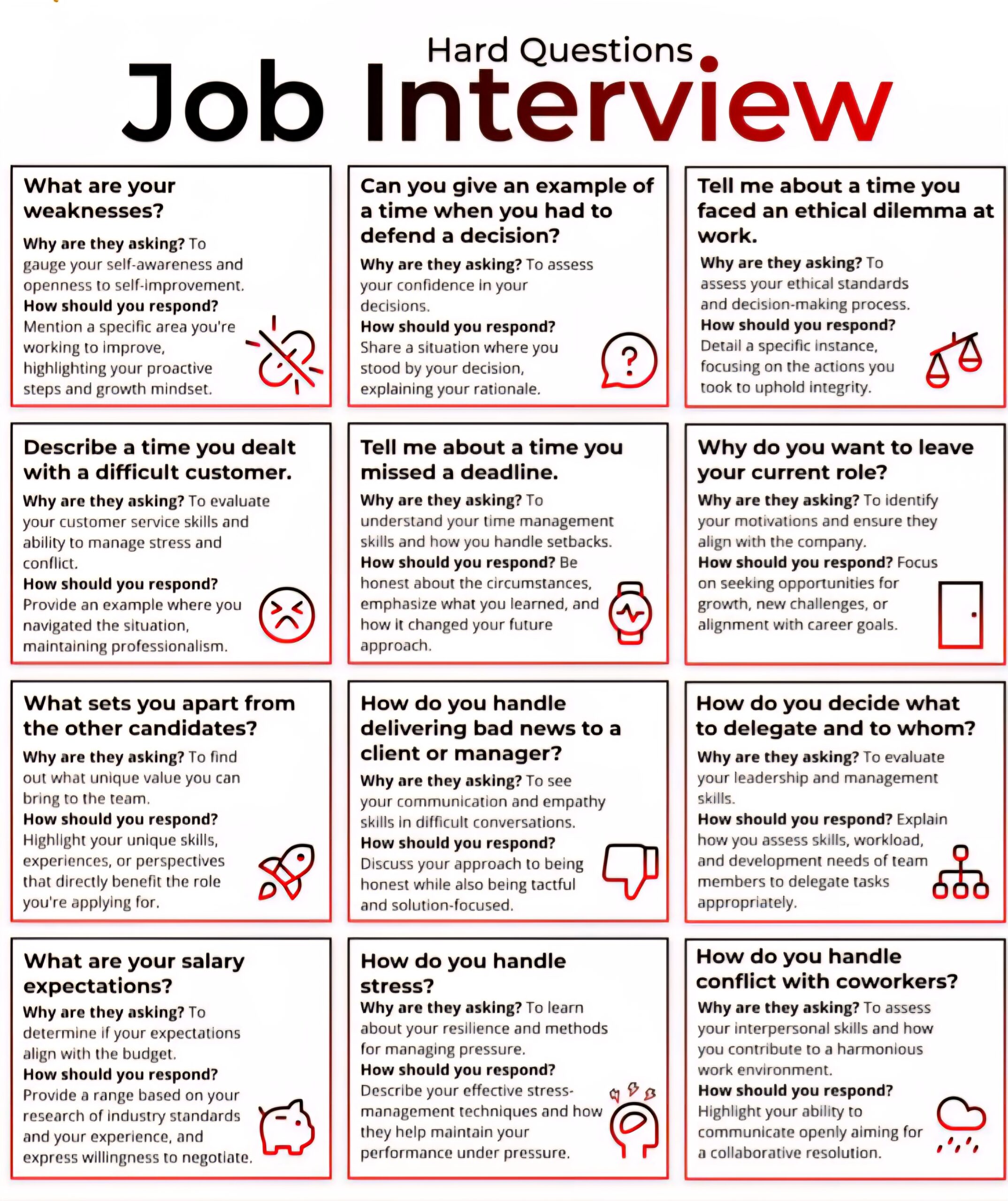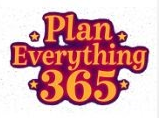
Job interviews often include tough questions that challenge you to think on your feet. These questions aren’t meant to trip you up—they help employers understand your personality, skills, and ability to handle the challenges of the role. In this guide, we’ll break down 12 common tough interview questions, why they matter, and how to craft the perfect response.
Why Do Employers Ask Tough Questions?
Tough questions dig deeper than surface-level answers. Employers want to:
- Assess your skills: Do you have the qualities needed to succeed?
- Understand your mindset: How do you approach challenges and learn from mistakes?
- Determine cultural fit: Will you thrive in the company’s environment?
According to a 2023 study by LinkedIn, 92% of hiring managers value soft skills like communication, adaptability, and problem-solving. Preparing for these questions helps you demonstrate those qualities and boosts your confidence.
12 Tough Interview Questions and How to Answer Them
Let’s explore these challenging questions, why they’re asked, and tips to tackle them effectively.
- What Are Your Weaknesses?
Why They Ask: To gauge your self-awareness and willingness to improve.
How to Answer:
- Choose a real weakness but one that won’t affect your ability to succeed in the role.
- Show how you’re working to overcome it.
- Avoid cliché answers like “I’m a perfectionist.”
Example:
“I’ve struggled with public speaking, but I’ve been taking classes to build my confidence and now volunteer for team presentations.”
- Can You Give an Example of a Time You Had to Defend a Decision?
Why They Ask: To assess your confidence and ability to handle pushback.
How to Answer:
- Share a specific story where you made a decision, faced opposition, and stayed firm.
- Emphasize your reasoning and the positive result.
Example:
“I implemented a cost-saving strategy that some team members resisted. I explained how it aligned with our goals, and we saved 15% without sacrificing quality.”
- Tell Me About a Time You Faced an Ethical Dilemma at Work.
Why They Ask: To evaluate your integrity and decision-making skills.
How to Answer:
- Focus on the actions you took to uphold ethical standards.
- Highlight the positive outcome of your decision.
Example:
“A vendor offered me gifts to influence a contract decision. I reported the incident to my manager and ensured we followed the company’s guidelines, maintaining transparency.”
- Describe a Time You Dealt With a Difficult Customer.
Why They Ask: To assess your customer service and problem-solving abilities.
How to Answer:
- Share an example where you resolved the issue professionally.
- Highlight your ability to stay calm and find a solution.
Example:
“A customer was upset about a delayed shipment. I apologized, offered a discount, and ensured expedited delivery. They appreciated my honesty and became a loyal customer.”
- Tell Me About a Time You Missed a Deadline.
Why They Ask: To see how you handle mistakes and learn from them.
How to Answer:
- Be honest about the mistake, but focus on the steps you’ve taken to improve.
Example:
“I underestimated the scope of a project, causing a delay. I’ve since adopted project management tools to better track timelines, and I haven’t missed a deadline since.”
- Why Do You Want to Leave Your Current Role?
Why They Ask: To understand your goals and avoid hiring someone who’s running away from problems.
How to Answer:
- Focus on the positives, like seeking growth, new challenges, or better alignment with your goals.
- Avoid badmouthing your current employer.
Example:
“I’m looking for opportunities to grow my skill set and take on more leadership responsibilities, which aligns with this role.”
- What Sets You Apart From Other Candidates?
Why They Ask: To identify the unique value you bring to the team.
How to Answer:
- Highlight specific skills, experiences, or perspectives that align with the role.
Example:
“My combination of data analytics skills and creative problem-solving helps me design strategies that drive measurable results.”
- How Do You Handle Delivering Bad News to a Client or Manager?
Why They Ask: To evaluate your communication and problem-solving skills.
How to Answer:
- Emphasize honesty, empathy, and a solution-focused mindset.
Example:
“I address the issue clearly and offer solutions. For instance, when a project faced delays, I informed the client immediately and proposed a revised timeline with added benefits.”
- How Do You Decide What to Delegate and to Whom?
Why They Ask: To assess your leadership and prioritization skills.
How to Answer:
- Explain how you match tasks to team members’ skills and monitor progress.
Example:
“I consider team members’ strengths and workloads, delegating tasks that align with their expertise while providing support as needed.”
- What Are Your Salary Expectations?
Why They Ask: To ensure your expectations align with their budget.
How to Answer:
- Research salary ranges for similar roles.
- Be flexible but confident in your worth.
Example:
“Based on my experience and market research, I’m looking for $70,000–$80,000, but I’m open to discussion.”
- How Do You Handle Stress?
Why They Ask: To see if you can stay productive under pressure.
How to Answer:
- Share specific techniques you use to manage stress.
Example:
“I prioritize tasks, break them into smaller steps, and practice mindfulness to stay calm and focused.”
- How Do You Handle Conflict With Coworkers?
Why They Ask: To evaluate your teamwork and conflict resolution skills.
How to Answer:
- Emphasize communication and collaboration.
Example:
“I approach conflicts by addressing them directly but professionally. I focus on understanding the other person’s perspective and finding a solution together.”
Tips for Answering Tough Questions
- Use the STAR Method: Structure your answers using the Situation, Task, Action, and Result framework.
- Be Honest but Strategic: Acknowledge challenges, but always end on a positive note.
- Keep It Professional: Avoid overly personal answers or speaking negatively about others.
- Research and Practice: Tailor your answers to the job description and practice them with a friend or coach.
- Stay Calm and Confident: Take a moment to think before answering, and maintain a positive tone.
How These Questions Improve Your Odds of Success
Preparing for tough questions increases your confidence and helps you stand out. A 2022 study by Glassdoor found that candidates who prepared for behavioral questions were 50% more likely to land the job. Employers appreciate thoughtful, well-structured answers because they showcase problem-solving, adaptability, and communication skills.
Final Thoughts
Tough interview questions may seem intimidating, but they’re your chance to shine. By preparing thoughtful responses, you can demonstrate your strengths and show employers that you’re ready for any challenge.
Take the time to reflect on your experiences, practice your answers, and go into your next interview feeling confident and prepared. Success is just a well-prepared answer away!
